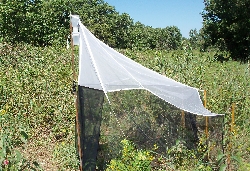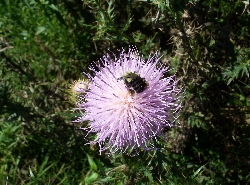Biology Professors Receive IDNR Grants
March 3, 2011
MACOMB, IL -- Two Western Illinois University biological sciences professors have received grants from the Illinois Department of Natural Resources (IDNR) to research Illinois creatures.
Tim Spier has received a grant of $1,100 for his project, "Freshwater mussel surveys of the Lamoine and Spoon river basins," while Ken McCravy was awarded $1,964 for his project, "Woodland bee and wasp diversity at Alice L. Kibbe Life Science Station."
According to Spier, through his research, he sampled the mussel communities living in the Lamoine and Spoon River basins in western Illinois. The Spoon River basin has a larger diversity of freshwater mussels; however, since the last study several years ago, the numbers have dropped to 20 and 16, respectively (from 41 and 31). Through his research, Spier has sampled nearly 40 locations on each river and its tributaries, which consisted of handpicking and snorkeling to collect the samples. Any live samples were returned unharmed, he added.
"It's important to monitor remaining mussel populations to ensure their preservation. Freshwater mussels are crucial components of freshwater ecosystems. They improve water quality by filtering organisms, and because of their inability to escape disturbances, such as pollutants and sedimentation, they are often a good indicator of the 'health' of water bodies," Spier explained. "The lack of mussels in a stream often indicates a problem with water quality. In addition, they are a food source for muskrats, otters, minks, fish and some birds. The rivers of Illinois once provided habitat for 80 species of mussels. Of those, 17 are no longer found in Illinois and only 27 species are considered stable."
Spier's research took place June through September 2010, and the results will be presented at the Freshwater Mollusks Conservation Society meeting this year, as well as at the Illinois American Fisheries Society and the Illinois Lake Management Association. Spier's study was also supported by the Illinois Smallmouth Alliance.
According to McCravy, little is known about the species, diversity, abundance and habits of native bees and wasps, compared to the honeybee, which is an introduced species. Because of the recent concerns about colony collapse disorder in honeybees, McCravy pointed out that it's essential to gain more knowledge on native bees due to the mounting evidence that these native species can provide "pollination insurance." A combination of sampling methods will be used to capture the insects.
"Most studies of native bees and wasps are done in agricultural or grasslands habitats, but little is known about the species inhabiting the woodlands. As part of my study, I'll be surveying native bees and wasps in the oak-hickory woodlands of the WIU Kibbe Station," McCravy added. "Besides inventorying the species at Kibbe, I will also examine seasonal patterns in the diversity of the bees and wasps, and comparing the species collected using different sampling methods."
McCravy will conduct the survey beginning this month through September.
Posted By: Darcie Shinberger (U-Communications@wiu.edu)
Office of University Communications & Marketing



Connect with us: